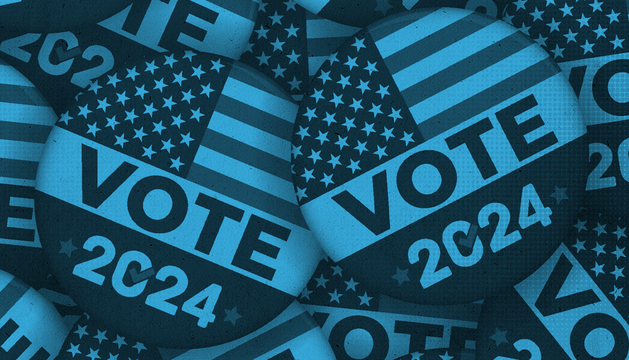Wisconsin Election Observers: Rules and Constraints
This resource details state and federal laws that govern who can be an election observer, what they can do, and how election workers can oversee them.
Part of
Written and Published in Partnership with All Voting is Local.
Election observers, referred to as “election observers” or “observers” in Wisconsin, are individuals who monitor polling places and ballot counting sites. While observers play an important role in providing transparency, they can also be a potential source of disruption and intimidation. For this reason, all states have a series of regulations and constraints regarding who can serve as poll watchers and what they can do. Wisconsin’s rules on observers, which derive both from the state’s election code and from guidance issued by the Wisconsin Elections Commission, are:1
Appointment
- Under Wisconsin law, anybody except a candidate can be an observer.2
- Observers may be at polling places and may also observe the absentee voting process at the municipal clerk’s office, central count processes, recounts, and voting in residential care facilities and nursing homes.3
- Observers must sign in on an election observer log.4
- The chief inspector or municipal clerks can limit the number of observers representing one organization simultaneously at one location and may also limit the areas that observers are allowed to access within a polling place, the clerk’s office, or absentee ballot site.5
- According to the Wisconsin Elections Commission’s guidance, observers must present photo identification to the chief inspector upon arrival and wear a badge or tag identifying themselves as an “election observer” when inside a polling place, clerk’s office, or absentee ballot site.6
Role of Observers
- Observers may monitor the election process without causing disruption to the voting location from within an observation area, designated by the chief inspector, that is no less than three and no more than eight feet from the sign-in table.7
- Only a qualified elector may challenge a voter’s eligibility for cause, meaning observers who are not eligible Wisconsin voters may not issue voter challenges.8More information on the rules and constraints on voter eligibility challenges can be found here. Electors who abuse the right to challenge are subject to criminal penalties or sanctions, and challenges based on a voter’s race or other identifying characteristics may violate federal law.9
Prohibited Activities
- Electioneering: No one, including observers, may engage in any activity intended to influence voting within 100 feet of any voting location.10This includes wearing clothing or buttons related to candidates, parties, or referenda intended to influence the election.11
- Intimidation or Influence: Attempting to intimidate or influence a voter through the use or threat of the use of force, violence, or restraint is not allowed.12Additionally, no person may solicit a voter to show how they voted.13
- Posting Election Material: No one may post materials in a polling place that describe the rights of individuals as it may mislead and confuse voters.14
- Carrying Firearms: Wisconsin law prohibits firearms in certain buildings often used as polling places, including schools and courthouses.15Even at locations where firearms are not expressly prohibited by statute, building owners or operators may bar firearms from the premises by posting signs in prominent places announcing the ban.16And when allowed at polling places, firearm carry may still constitute unlawful intimidation.
- Disobeying Instructions: When poll workers and election officials give lawful instructions, observers must follow them. Observers may not engage in disorderly conduct at or near a polling place or disturb voting or canvassing proceedings.17
- Viewing Election Materials: Observers cannot view the confidential portions of registration or poll lists. However, observers may request the number of people on the registration list and the number who have voted.18
- Photography and Video: No person may take photographs or videos in a polling place. The only exceptions are observers given permission by a clerk to photograph poll lists and media members who sign in with the chief inspector, are not disruptive, and do not show how anyone voted. At the municipal clerk’s office and nursing homes, photographs and videos are banned without exception. At central counting and recounting locations, photographs and videos are allowed if they are not disruptive and do not show how someone voted.19
- Phone Calls: Observers may not make calls inside the polling area.20
- Voter Interaction: Observers may not interact with voters unless a voter requests it.21They also may not enter the vehicle of a curbside voter.22
Federal and state law strictly prohibit all people, including observers, from engaging in voter intimidation. Any action that makes a voter feel intimidated, threatened, or coerced (including any effort to prevent a voter from registering to vote, voting, or voting for or against any candidate or ballot measure) could constitute voter intimidation, regardless of whether it breaks a specific rule.23More information on the federal and state laws that protect Wisconsin voters from intimidation can be found here.
Removal
- Election inspectors may remove any observer who fails to comply with an election worker’s lawful instruction, disrupts the election proceedings or the canvass of the votes, engages in electioneering, or posts election-related materials.24
- If an observer fails to follow the instructions of the election inspector, the inspector may, if necessary, order law enforcement to remove the disruptive observer.25
Endnotes
-
1
On September 11, 2024, the Wisconsin Elections Commission approved final draft language for EL 4 Rule Order, that would codify many of the provisions in its guidance document. At the time of publication, this rule is not set for final approval until 2025.
-
2
Wis. Stat. § 7.41(1).
-
3
Wisconsin Elections Commission, Wisconsin Election Observers: Rules-at-a-Glance, 2, updated March 2022, https://elections.wi.gov/sites/default/files/legacy/2022–03/Election%2520Observer%2520Rules%2520at-a-Glance%2520March%25202022.pdf.
-
4
Wis. Stat. § 7.41(1).
-
5
Wis. Stat. § 7.41(1)-(2).
-
6
WI Elections Commission, Rules-at-a-Glance, 1.
-
7
Wis. Stat. § 7.41(2)-(3).
-
8
Wis. Stat. § 6.925; and Wis. Admin. Code § EL 9.02.
-
9
Wis. Stat. §§ 12.13(1)(b), 12.13(3)(g); and Wis. Admin. Code § EL 9.02.
-
10
Wis. Stat. § 12.03(2).
-
11
WI Elections Commission, Rules-at-a-Glance, 1.
-
12
Wis. Stat. § 12.09.
-
13
Wis. Stat. § 12.13(3)(q).
-
14
Wis. Stat. § 12.035.
-
15
Wis. Stat. §§ 941.235, 948.605, 175.60(16)(a)(6)–(7); and Meagan Wolfe (Wisconsin Elections Commission Administrator), memorandum, Re: Summary of Wisconsin Weapons/Physical Security Laws and Applicability to Polling Places, 1, October 20, 2020, https://elections.wi.gov/sites/default/files/legacy/2020–10/Weapons_Polling%2520Place%2520Memo%252010–23–2020.pdf.
-
16
Wolfe, Re: Summary of Wisconsin Weapons, 2.
-
17
Wis. Stat. §§ 7.37(2), 12.13(3)(x); and WI Elections Commission, Rules-at-a-Glance, 1.
-
18
Wis. Stat. § 7.41(4).
-
19
WI Elections Commission, Rules-at-a-Glance, 1.
-
20
WI Elections Commission, Rules-at-a-Glance, 1.
-
21
WI Elections Commission, Rules-at-a-Glance, 1.
-
22
WI Elections Commission, Rules-at-a-Glance, 1.
-
23
18 U.S.C. §§ 241, 594; 52 U.S.C. § 10101(b); and Wis. Stat. § 12.09.
-
24
Wis. Stat. §§ 7.37(2), 7.41(3).
-
25
Wis. Stat. § 7.37(2); and WI Elections Commission, “FAQ,” last accessed May 28, 2024, https://elections.wi.gov/faq#accordion-894.
More from the Election Observers Rules and Constraints series
-
Arizona Election Observers: Rules and Constraints
This resource details state and federal laws that govern who can be an election observer, what they can do, and how election workers can oversee them. -
Florida Election Observers: Rules and Constraints
This resource details state and federal laws that govern who can be an election observer, what they can do, and how election workers can oversee them. -
Georgia Election Observers: Rules and Constraints
This resource details state and federal laws that govern who can be an election observer, what they can do, and how election workers can oversee them.



